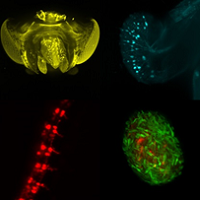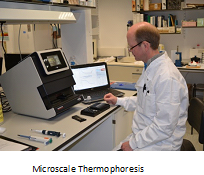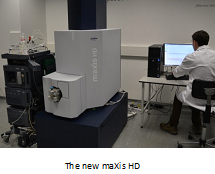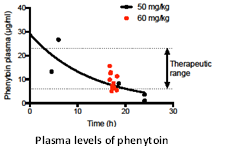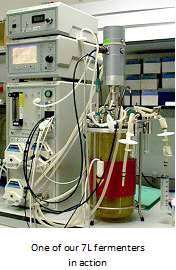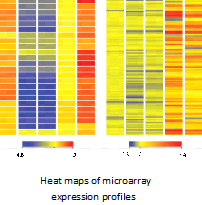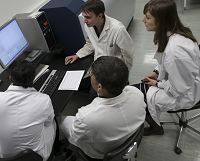Bioscience Technology Facility Update Spring 2015
The Bioscience Technology Facility provides you and your organisation with access to expertise, equipment and training in genomics, bioinformatics, proteomics, protein production, molecular interactions, imaging, and flow cytometry.
Below are some recent highlights:
The Imaging & Cytometry Lab is currently able to offer access to the new Zeiss Light Sheet microscope that can deliver stunning, three dimensional images at depths greater than standard confocal microscopy whilst able to rotate the sample to view all angles. This is through our collaboration with Zeiss as an official Zeiss Labs@Locations site. So far we have stunning images of (clockwise from top left):
- Drosophila head
- Sensory neurones
- Stem cell spheroid
- Developing neuronal system in Zebrafish
The recent installation of our NT115 Microscale Thermophoresis instrument from Nanotemper in the Molecular Interactions Lab greatly enhances our ability to quantify how different components of cells (e.g. proteins and nucleic acids) interact with each other and with putative drugs and other molecules.
A major advantage is the ability of the technique to screen these interactions rapidly under physiological conditions. For example, antibody concentrations and drug binding affinities can be determined directly in serum.
The capabilities of the Proteomics Lab to undertake shotgun proteomics and quantification work have received a recent boost with the successful installation of the new maXis HD mass spectrometer from Bruker Daltonics within our Centre of Excellence in Mass Spectrometry. We are already seeing massive improvements in both the number of unique peptide hits and proteins identified.
Quantitative measurement of drug levels in serum is critical to define dosing regimes in many studies on drug activity. Using liquid chromatography – mass spectrometry with single reaction monitoring our Proteomics Lab were able to quantify the levels of phenytoin in plasma, thereby providing critical information for a recent study that has identified a potential anti-cancer use for anti-epilepsy drugs such as phenytoin.
Biotransformations involve the use of a microbial culture or an isolated enzyme to catalyse specific reactions. This is an increasingly important area as our ability to clone, overexpress and modify the activity of target enzymes grows. The expertise in recombinant technology, generation of mutants, and fermentation in our Protein Production Lab were all brought together in a recent collaboration that successfully demonstrated the scalability of an important monooxygenase expressed in Escherichia coli. We are now producing large quantities of the purified enzyme to aid structural studies aimed at improving the catalytic function of the enzyme even further.
Our Genomics and Bioinformatics Labs have been involved in the in-depth analysis of the expression of genes required in flagellum biosynthesis and chemotaxis. The analysis of data from a custom designed Agilent microarray demonstrated changes in the expression of key genes involved in flagellum formation and nitrogen regulation between ancestral and evolved genotypes of Pseudomonas fluorescens. This helped the researchers to understand how bacteria can restart their ‘outboard motor’ (the flagellum) via the evolutionary re-wiring of their own genes and thereby rapidly overcoming what would otherwise be a catastrophic mutation.
If you are an SME in the Leeds City Region you could gain matched funding to attend our courses through the Leeds City Region Skills Service.
We offer a wide range of training courses which are summarised in the right-hand column of this Newsletter and on the web site. For more information on this new initiative, please contact Rachel Cullivan.
The Leeds City Region includes: Barnsley, Bradford, Calderdale, Craven, Harrogate, Kirklees, Leeds, Selby, Wakefield, and York.
We are always interested in collaborative research where we can bring our expertise and technology to help solve your problems. We can also help open up leveraged funding and there are currently many different sources of funding to develop a collaboration that we have experience of. For example:
- The University of York Small Innovation Projects, which provide up to £6.5k for SMEs in Yorkshire and Humber with no requirement for matched funding - only a few remaining!
- BBSRC Networks in Industrial Biotechnology and Bioenergy, which have a range of funding opportunities including £5k Business Interaction Vouchers.
- The TSB Innovation Vouchers, which provide £5k to assist with getting expert help
- Knowledge Transfer Partnerships, where we have a 100% record in Associates being subsequently employed by the industrial partner.
Industrial CASE Studentships, the BBSRC, MRC, and NERC 2015 calls being expected to open late Spring.

Technical Training Courses:
As well as providing bespoke training, our open training courses to be held in the near future include:
Beginners' Android App Programming Course 22 April 2015
Flow Cytometry Course 9-12 June 2015
Python Programming Course 1 & 2 July 2015
Confocal Microscopy Course 8-11 September 2015
Bioscience Insight Day 10 November 2015
Further information and contacts for:
General:
btf-enquiries@york.ac.uk
Bioinformatics
peter.ashton@york.ac.uk
stuart.priest@york.ac.uk
Genomics
peter.ashton@york.ac.uk
Imaging & Cytometry
peter.otoole@york.ac.uk
Molecular Interactions
andrew.leech@york.ac.uk
Protein Production
jared.cartwright@york.ac.uk
Proteomics
jerry.thomas@york.ac.uk
Director of the TF
john.pillmoor@york.ac.uk
Technology Facility
Department of Biology
University of York
York
YO10 5DD
Tel: 01904 32 8821
Fax: 01904 328804
btf-enquiries@york.ac.uk
